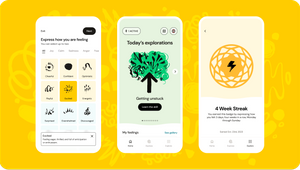
How to Prepare for Mobile’s Next Breakthrough

What should clients be focusing the most on right now?
Prepare for What’s Next: It’s time for brands to start redefining what’s mobile. Whatever makes your life easier is mobile, not just phones. We are not far away from the next breakthrough, so it’s the right time to stabilise for the next wave of innovation. There have been no other significant, groundbreaking hardware technologies that have come to market lately, aside from Apple Vision Pro, but nothing has had the same success with users compared to mobile or smartwatches. This is the perfect time to update mobile apps because we are on a stable software cycle with mature APIs in place.
Utilising AI Across Products: Brands should consider how they can use AI to augment current products to make them more accessible and beneficial for users.
Consolidating Your Tech Stack: Managing multiple tech stacks for mobile and web costs more and takes longer due to multiple QA cycle requirements. Companies are increasingly wanting one tech stack to manage everything. That’s where the industry is heading.
Creating Apps to Capture User Attention: Another major user behaviour is app saturation. Users don’t want to download an app for every single thing they do and they tend to forget about the app eventually. App creators should consider what features can make their apps stand out and keep users attention within a short amount of time.
What is unique about having a culture that is a balance of 50% engineers and 50% creatives?
A 50/50 balance of engineers and creatives fosters a shared understanding of the product development process, from strategy and design to engineering. This shared language eliminates the need for re-education and reduces communication breakdowns often seen in companies with disparate teams. A shared understanding enables smoother collaboration between teams, leading to more efficient and innovative product development. A cohesive team like ours can better align product goals, design aesthetics and technical feasibility, resulting in higher-quality products.
There are companies that just do what the clients ask, but our biggest differentiator is that we want clients to be successful. We want to be good partners so we ask them hard questions that make them think. It’s important to have a team that can meet those needs and answer the tough questions with you.
What’s the best way to keep staff motivated and working at a high level?
The past few years have been hard, and the whole world can see what’s happening in the software industry. We motivate our teams by talking about our progress in ongoing work, encouraging people to take up certifications and providing opportunities for them to speak about their passion projects.
We want our teams to feel empowered to try out new tech and keep learning. It’s like dressing for the weather — you have to adapt to the situation. I tell them, “Stay curious, keep learning the basics and don’t get freaked out when the industry takes a turn. Remember, the fundamentals are always there, even when things get crazy. Just keep exploring and growing.
I’ve experienced both ups and downs in the industry. It’s a cyclical pattern. If you analyse the data, you’ll see there are always peaks and valleys. We have hit the bottom, but the only way from here is up. And each time that happens, something new emerges. In 2007, the mobile industry was struggling (rather boring 🙂), but then Apple came along and turned things around. That’s what’s so exciting for us — there’s always something new on the horizon.
My vision is to build a team that is not only technically proficient but also deeply committed to creating software that has a positive impact on both our team members and the people who use our products. We’ll achieve this by fostering a culture of innovation, collaboration and, most importantly, open communication.
What excites you most about the future of mobile?
It’s awesome to see the impact we can make across so many industries, from healthcare to finance to e-commerce. Our work touches people’s lives in a big way, and that’s what makes it so exciting. It’s like being a problem-solving superhero, helping companies level up their products in all sorts of fields.
A favourite project you’ve worked on in the past couple of years & why?
One of my favourite projects in the past couple of years was working with a major e-commerce client. We had a super tight deadline — only 3–6 months to build and launch a new platform. It was a challenge because we had to work with existing code and integrate new technologies. And then, of course, there was the whole COVID-19 thing, which made the work even more challenging. We had to make sure our team had everything they needed to work remotely and still meet the deadline.
Another cool project was working with a financial services client. We did everything from creating a mobile app to web and backend, and it really helped us understand how that industry works. Whenever I get to learn something new, it becomes a favourite project.
A piece of advice you’d tell your younger self?
If I could go back and talk to my younger self, I’d say, “Take a deep breath and slow down a bit.” For the first decade or so, I was so focused on my career that I missed out on a lot. It definitely helped me grow, but I sometimes wonder where all the time went.
It’s also important to specialise in something. I tried to do everything, but that made it hard to be really good at one thing.
Lastly — be adaptable. In a rapidly changing industry like ours, it’s essential to be able to pivot and adjust our strategies as needed.















